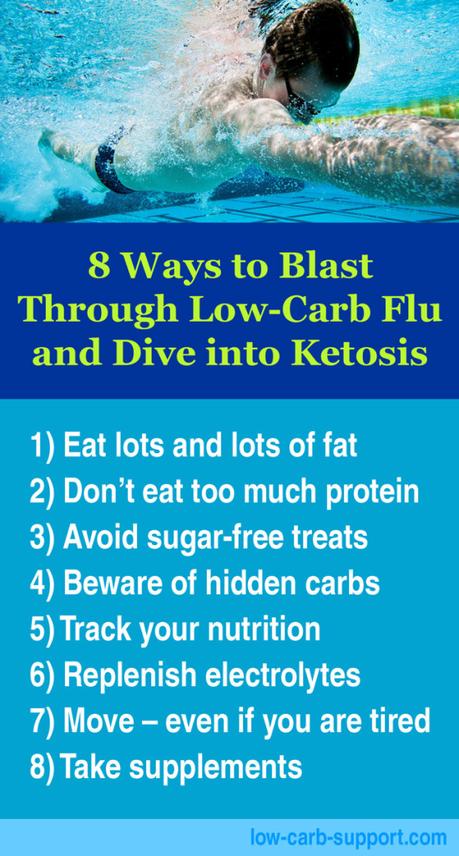 Have you just started a low-carb diet? Do you find yourself feeling exhausted and overcome by tiredness? Perhaps you are thinking that going low-carb wasn't a good idea after all...
Have you just started a low-carb diet? Do you find yourself feeling exhausted and overcome by tiredness? Perhaps you are thinking that going low-carb wasn't a good idea after all...
You might already know that these symptoms are not uncommon, especially if you are doing low-carb for the first time. Also known as " low carb flu" or " Atkins flu", this phase is completely normal - although by no means pleasant. This condition usually happens when you cut your carb intake very sharply, to about 20-30g a day, in order to induce ketosis.
What is low-carb flu?
Your body is used to running on carbs. It's been operating this way for decades. Cutting carbs in favour of fat is a huge change for your metabolism. Your body needs some time to adjust to this change.
This period of adjustment can sometimes cause flu-like symptoms. Fatigue is the most common one, but you could also get muscle crumps, headaches, dizziness and mental fog.
Some of these symptoms are markers of sugar withdrawal. Sugar addiction is real and indeed very common, so trying to break away can be very difficult initially.
Please note that "low carb flu" does not include fever or cold-like symptoms such as coughing or sneezing. If you are experiencing any of these, it means that you might have actually caught an infection! So it would probably be a good idea to postpone starting your diet until you are all clear.
How can you fight tiredness and other symptoms of low-carb flu?
First of all, remember that it won't last forever. Low-carb flu usually lasts around 3-5 days (although could be 1-2 weeks for some unlucky people with high metabolic resistance).
Here are some simple tips on making this transition easier.
1) Eat more fat
Fat is the key to this whole issue. You must eat lots of it - a lot more than you were getting before. You are replacing carbs with fat as your main source of energy. Aim to get at least 60% of your total calories from fat. Some people go as high as 80%.
This is actually not easy, unless you are making a conscious effort to get more fat with every meal. We have all been conditioned by the media to avoid fat. They have now admitted they were wrong, but we are all stuck with the habit of avoiding fat! You will need to reverse this conditioning and embrace fat.
- Eat fatty meats (for example, rib-eye steak, pork belly, lamb chops, bacon), poultry (with skin), fatty fish such as salmon, and egg yolks
- Add butter and vegetable oils to your cooked vegetables and salads
- Use full-fat cream (or even butter if you are brave enough) in your tea and coffee
- Snack on cheese, avocados, macadamia and brazil nuts
- Use high-fat sauces (such as Bearnaise) and condiments (such as mayonnaise)
2) Don't eat too much protein
Too much protein can actually be detrimental at this stage. You should aim to replace the carbs you are not eating with fat, rather than with protein. So keep the amount of protein around the same or slightly higher than what you are used to.
Your body has a sneaky way of converting excess protein into carbs, and you definitely don't want that at this stage!
3) Avoid sweeteners and sugar-free treats
There are plenty of sweeteners and sugar-free products on the market, some of them claiming to be completely safe for low-carb diets. The jury is still out on these claims, but you should avoid these while you are in your transitional "low-carb flu"period.
You are trying to break away from the addiction to sugar and sweets. Your body needs to get used to using fat instead of carbs. Consuming sweet-tasting treats will confuse your system, and is likely to cause stronger cravings and set you back. Once you have made the switch and become adapted to low-carb, you could reconsider these products.
Read more about the dark side of sweeteners4) Make sure you carb intake is low enough
The standard recommended carb intake for ketosis is 20-30g a day. For some people, this level might need to be even lower. If you are struggling, try reducing the carbs a bit further, to 13-15g. Do not go below 10g a day.
Another possible trap is inaccurate carb counting. Carbs can hide in unexpected places, so always read labels carefully. Better still, cook from scratch from whole ingredients only. Weigh your food and do not make any assumptions about its carb content - always check if you are not sure.
5) Track your nutrition
Having said all this, it is definitely a good idea to track your nutrition by keeping a food diary. You can use a food tracking app, a web-based service, or just plain pen and paper. The important point is to be honest with yourself, track all your food accurately and check your intake of carbs, fat and protein throughout the day to make sure you are on track.
If you don't track your food, you are very likely to deviate from your diet's guidelines and get stuck in the low-carb flu period for a long time.
6) Get enough water and replenish electrolytes
Drinking enough water is another crucial factor. This is easy for most people as going low-carb does make you more thirsty than usual, so drinking more just happens naturally. Be aware that thirst can sometimes masquerade as hunger or sugar cravings.
One downside of drinking lots of water is that your electrolytes (such as sodium, magnesium and potassium) get washed out with it. You need to replenish electrolytes regularly; otherwise you might get muscle crumps and headaches. You can do this by taking supplements or drinking mineral water instead of plain water. Simply adding more salt (sodium) to your food also helps.
7) Move - even if you are tired
When you are in the middle of low-carb flu, the last thing you feel like doing is moving. However, it is very important to do something. Your energy levels will be lower than usual, so don't expect to be able to do your normal amount of exercise, but don't be tempted into just sitting or lying down all day. Your body will try to conserve energy, but the only way to encourage it to tap into your fat reserves is to spend energy.
If you can't do anything else, at least drag yourself out and go for a walk. It doesn't have to be fast or energetic. Just walk.
8) Take supplements
Dietary supplements make a big difference during the low-carb flu. They can improve your energy levels and speed up the transition to ketosis.
- Minerals - as mentioned above, supplementing key minerals helps to maintain electrolyte balance, which is important because as you will be drinking a lot more than usual
- Extra-strong B and C vitamins (1000-2000% of RDA) have been proven by numerous studies to reduce tiredness and fatigue, and improve energy-yielding metabolism
- Co-enzyme Q10 and L-Carnitine - Dr Atkins recommended these two nutrients for speeding up the transition to ketosis and overcoming metabolic resistance
- Chromium helps to normalise blood glucose levels and has been known to reduce cravings and aid weight loss
Please check out our online low-carb shop to buy these supplements.
Nutri-Align Multivit formula for low-carb dieters includes extra-strong vitamins and minerals, chromium and L-Carnitine.


